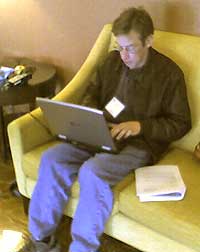New connections
Sometimes the clock just sits there, slowly grinding gravel into sand, and sometimes everything seems to happen at once. We're heading into one of the latter times now. Stuff from the back burner, things we have been chipping away at month by month, all come to a head. A lot of the action is being driven by new projects and initiatives from our network partner, NPR.
The big news of the last few days was NPR's acquisition of Public Interactive, the platform host of many public radio websites, and a service provider to many more, NCPR among them. The merger may save us some change in the long run, but it will help most in facilitating our use of content from public radio programs that originate with PI's former parent, Public Radio International, and with other media services PI has under contract. It will beef up NPR's digital shop and will help PI stations play more effectively on the national stage.
NPR is making a big investment in social networking for the public radio community and is set to roll out a platform on which stations can foster their own communities within NPR.org. Look for lots more on this in late September.
NPR has also jump-started stations into the arcanely-labeled field of mobilecasting, making a mix of station and network features available via cell phones and other mobile devices. NCPR expects to join them by November. For those of you who wish your cell phones had a cord and a dial, there will be a regular phone number you can call from any type of phone to get the latest NCPR and NPR news and features. This will make NCPR available for the first time in remoter parts of the region that don't have broadband internet, or cell service, or even radio reception.
Speaking of mergers, I have saved the best for last. NCPR station manager Ellen Rocco is tying the knot this weekend with Adirondack potter Bill Noble. We wish them all the best.
Labels: mobilecasting, NPR, pubforge, public radio, social networking, usability, web design


